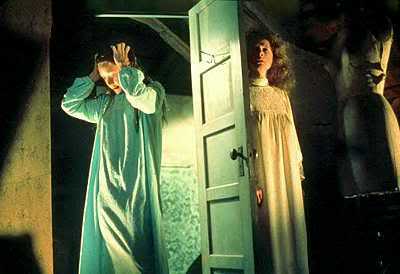DIRECTOR INFLUENCED BY DE PALMA FOR BABY DRIVER
 While talking to The Playlist's Kevin Jagernauth about Scott Pilgrim vs. The World, director Edgar Wright mentioned that he is working on an original script that delves into the "purely visual" in a way a Brian De Palma film frequently does. According to Jagernauth, the script is called Baby Driver, and here is how Wright described it to him:
While talking to The Playlist's Kevin Jagernauth about Scott Pilgrim vs. The World, director Edgar Wright mentioned that he is working on an original script that delves into the "purely visual" in a way a Brian De Palma film frequently does. According to Jagernauth, the script is called Baby Driver, and here is how Wright described it to him:Well, it’s something I’ve been meaning to write for ages. I really planned to recharge my batteries and get back into writing. I’m excited about doing something that’s almost purely visual, because I’ve done three films—and even though Scott Pilgrim is very visual, it’s very dialogue heavy as well, which is great. And music heavy. Yeah. I think I’d like to try something—I’m a big Brian De Palma fan, and I’ll sit and look at something like "Carrie," and I like the fact that it starts to play out like a silent movie. There’s a point in "Carrie" in the last half hour where there’s no need for any more dialogue because the plot is in motion. Or something like [Jean-Pierre Melville's] "Le Samourai," I look at something like that and think, wow, there’s hardly any dialogue in this film. Something like that can be enjoyed around the world. I’d really like the challenge of doing something where the dialogue is really stripped back and it’s all about the cinema.
Elsewhere in the interview, Wright tells Jagernauth how he was originally not going to use much music at all in Scott Pilgrim vs. The World, "because we saw that most fictional bands in films suck, and we thought we’d do a running joke on it." But as the music began coming in (from Beck and others), Wright started to see things differently:
I found out that once I had the songs, I allowed myself more time to let them breathe. So I think the first Sex Bob-Omb song, "Garbage Truck," maybe originally I thought they’d play the first verse and just before it kicked into the forest, [Matthew] Patel would interrupt, but then it was like, "no fuck it, let’s just listen to it." And when the songs started to expand, I thought, "wow, I’m really starting to get that vibe more like a sixties or seventies film." Some of those films like "Phantom of the Paradise" or "Beyond the Valley of the Dolls," I would love it when they would go, "And now, the Strawberry Alarm Clock will play" or "Now The Carrie Nations will play" and it’d be like 10 minutes of the film. That was something that definitely developed once we had the material. I think in an early cut of the film, I think we played the whole of [Metric's] "Black Sheep." That’d be on the DVD, one version. In fact, when we shot the songs, we shot the full songs with all the artists, so we have different versions of them which we’ll put on the DVD.
In a separate interview with the Daily Comet's Dave Itzkoff, Wright again called out Stephen Chow’s Kung Fu Hustle and De Palma’s Phantom of the Paradise as the "true antecedents" [Itzkoff's words] of Scott Pilgrim vs. The World, but said he was wary of citing those films in meetings with executives, because "you don’t want to reference things that are way too obscure.”
SCOTT PILGRIM REVIEWS COMING IN
Meanwhile, the reviews for Scott Pilgrim vs. The World are coming in as the film is released this Friday. Armond White at the New York Press loves the film, contrasting it with the work of one of his favorite targets, Quentin Tarantino. The latter's films, according to White, are "pop-referencing movies" that "extract all social and political contexts," while Wright's pop-referencing is done as "a social satirist."
At The Pacific Northwest Inlander, Ed Symkus writes in his review that "Wright keeps the film sprinting along, throwing in a split-screen segment here and an exciting rock performance there — with another super-stylized fight right around the corner. There turns out to be as much talk as there is action, and by the time we’re introduced to the (sorta) villainous Gideon Graves (Jason Schwartzman), the film has slickly turned into a diatribe against the cold, heartless record business. If you want to see anything remotely like it, check out Brian De Palma’s Phantom of the Paradise — a film that was as far ahead of its time for 1974 as Scott Pilgrim is for today."
Updated: Sunday, August 15, 2010 6:20 PM CDT
Post Comment | Permalink | Share This Post



